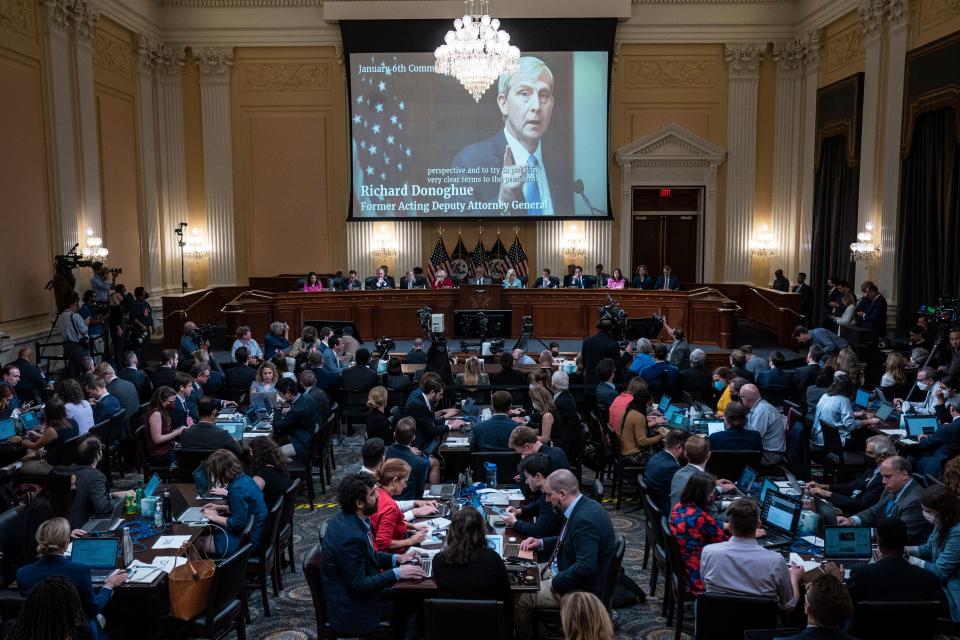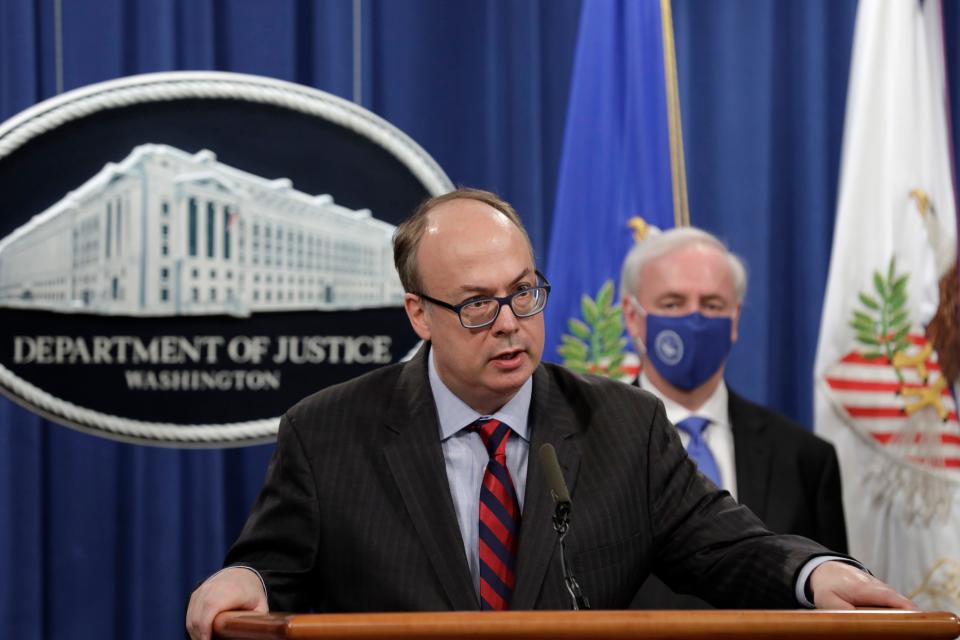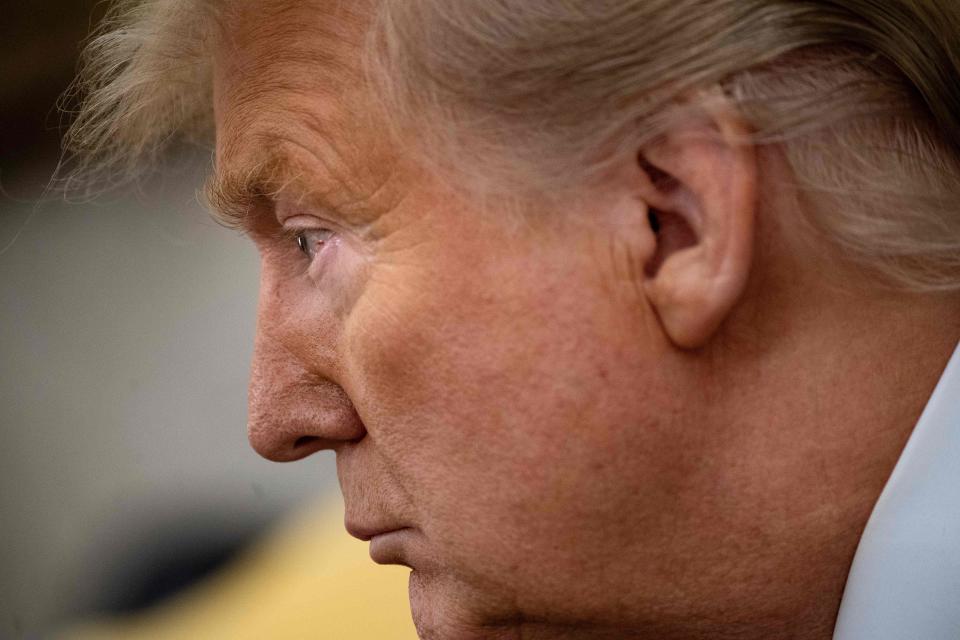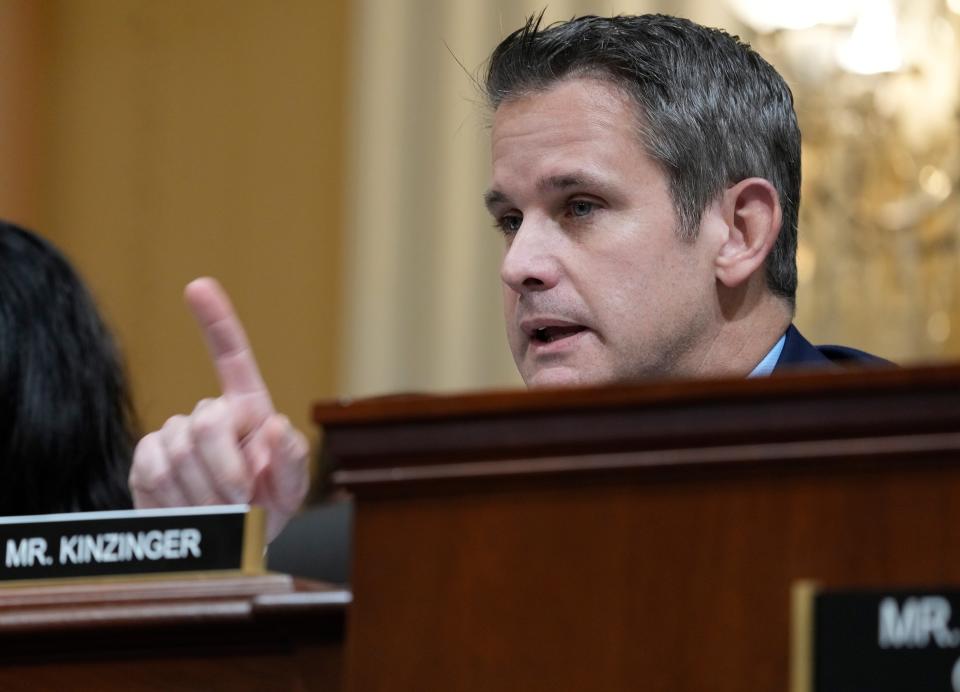How Justice leaders Rosen, Donoghue and Engel held the line against Trump in the run-up to Jan. 6
- Oops!Something went wrong.Please try again later.
- Oops!Something went wrong.Please try again later.
- Oops!Something went wrong.Please try again later.
- Oops!Something went wrong.Please try again later.
- Oops!Something went wrong.Please try again later.
- Oops!Something went wrong.Please try again later.
WASHINGTON – When Jeffrey Rosen arrived at the Justice Department as deputy attorney general in 2019, he did so as a relative unknown whose striking lack of prosecutorial experience drew sharp criticism from Democratic lawmakers.
A former top official at the Transportation Department, Rosen was replacing Rod Rosenstein, whose tumultuous tenure had been inextricably linked to the Russia investigation and who had become a punching bag for then-President Donald Trump.
A few months after his confirmation, Rosen would acknowledge his role as "the new guy," adding that the experience deficit had so far presented few problems.
"You know, it’s always risky to assume that you know what you don’t know," he said in an interview with USA TODAY shortly after taking office. "So, I’m sure there are things I don’t know... ”
What happened on Day 5 of the Jan. 6 hearings: Jan. 6 hearing takeaways: 'Just say it was corrupt,' Trump told DOJ officials about 2020 election
What Rosen could not have known at that time is how he would be thrust into the role of acting attorney general following the early exit of Bill Barr and headlong into a bitter fight for the independence of the Justice Department that Trump sought to enlist in a campaign to subvert President Joe Biden's election.
On Thursday, Rosen outlined Trump’s pressure campaign before a special House committee investigating the Jan. 6, 2021, Capitol attack in testimony that cast the former unknown and a small cadre of top aides, including blunt-spoken former Brooklyn U.S. attorney Richard Donoghue, as crucial guardians of a then-wobbly democracy.

From the December 2020 installment of Rosen as acting attorney general, and Donoghue, acting deputy attorney general, the pair recounted a relentless effort by the president to bend the department to serve his political interests, culminating in a dramatic Jan. 3 Oval Office meeting in which Trump threatened to replace Rosen with rogue Justice loyalist Jeffrey Clark to pursue baseless allegations of voter fraud. Facing down that threat, Rosen, Donoghue and Steven Engel, a former assistant attorney, ultimately forced the president to step back from a brink promising mass resignations that surely would have plunged the country into unprecedented crisis.
"The issue was the use of the Justice Department, and it's just so important that the Justice Department adhere to the facts and the law," Rosen told the committee, recalling the tense confrontation. "If the Justice Department gets out of the role that it's supposed to play, that's really bad for our country..."
Donoghue would offer the darkest assessment of the president's proposed action:
"I'm telling you what's going to happen," Donoghue recalled telling Trump. "You're going to lose your entire department leadership. Every single (assistant attorney general) will walk out on you. Your entire department leadership will walk out within hours. And I don't know what happens after that... What's that going to say about you?"
Jan. 6 committee evidence: Is the Jan. 6 committee sitting on explosive evidence of Trump's role in the Capitol assault?
Most, if not all, of the testimony offered during Thursday's House committee hearing had been previously documented and made public last year in a report by the Senate Judiciary Committee. Yet the accounts of the key witnesses – all Trump nominees – appeared to offer an even more powerful narrative of the former president's desperate efforts to cling to power.
“They did their jobs," said Alberto Gonzales, a former attorney general in the George W. Bush administration. "I would like to think that others would hold the line just as they did. But these were brave men, and I am proud of what they did for our country.“

'Say it was corrupt'
When Barr announced his December 2020 departure from Justice, after delivering a stunning public rebuke of Trump's election fraud allegations, the president immediately turned his focus on Rosen and Donoghue.
Barely a day went by, with the possible exception of Christmas, that Trump did not call on Rosen to pursue baseless allegations of election improprieties, no matter how outlandish. About the same time, Rosen told the committee, that he first heard Trump make a "peculiar" reference to Clark, who was serving as acting chief of the department's Civil Division in the final weeks of the administration.
'Subverting Justice':Senate panel details the 9 times Trump pressured DOJ to overturn election results
Clark, an environmental lawyer, would later acknowledge having met with Trump in the Oval Office, as the president sought to push Justice to take the lead in the voter fraud fight.

While admonishing Clark for making the unauthorized contact, Rosen said he and Donoghue were quickly consumed with beating back Trump's constant entreaties for Justice to act. In short order, Trump asked for the appointment of a special counsel to investigate election fraud nationwide; he called for the seizure of voting machines that he falsely believed had been manipulated; and he peddled a bizarre theory that an Italian defense contractor had somehow uploaded software to a satellite that switched votes from Trump to Biden.
Each time, the Justice officials pushed back, variously describing the claims as "pure insanity" and totally without merit.
Their responses, the officials testified, only seemed to further agitate the president who Donoghue said made a startling statement during a heated late December telephone call with Rosen and Donoghue, who took handwritten notes.
"Just say the election was corrupt and leave the rest to me and the Republican congressmen," the president said, according to Donoghue's notes.
Jeffrey Clark's home searched day before Jan. 6 hearing: Feds search home of Jeffrey Clark, ex-DOJ official at center of Trump's effort to overturn election
The enemy within
All the while, Rosen and Donoghue would discover that Clark was taking a more active role on Trump's behalf.
The Justice officials said they were taken aback after receiving a Dec. 28, 2020 email from Clark containing a draft letter directed to Georgia officials falsely stating that Justice had found "significant concerns" that could throw the outcome of the election in "multiple states, including the state of Georgia" in doubt.
"For the department to insert itself into the political process this way, I think would have had grave consequences for the country," Donoghue testified. "It may very well have spiraled us into a constitutional crisis."
Donoghue said the email prompted a contentious meeting with Clark in which he and Rosen again admonished the attorney.
But the officials testified that Clark's work continued, while the president moved closer to a decision on ousting Rosen in favor of his Justice loyalist, Clark.
Threats against Jan. 6 committee: Jan. 6 committee members are receiving rising threats of violence, GOP Rep. Adam Kinzinger says

"I wanted to make sure that he understood the gravity of the situation, because he didn't seem to really appreciate it," Donoghue told the committee of his discussions with Clark.
The building crisis came to a head, Rosen said, on Sunday afternoon, Jan. 3, 2021, when Clark abruptly informed him that Trump had offered him Rosen's job and that he was accepting it.
Rosen said he immediately requested a meeting with the president.
"I wasn’t going to accept being fired by my subordinate,” Rosen testified, adding that he wanted to talk directly to Trump to try to convince the president not to “go down the wrong path” that Clark was advocating.
“I did not want... the Department of Justice to be put in a posture where it would be doing things that were not consistent with the truth, were not consistent with its own appropriate role, or were not consistent with the Constitution,” Rosen testified.
That evening, the principals assembled at the White House, where Donoghue, with no time to change from an Army t-shirt and muddy boots, joined Rosen and Engel after the session began.
When the conversation turned to Trump's intention to appoint Clark, Donoghue pushed back hard.
Democracy vs. witch hunt: What congressional campaigns are posting about Jan. 6 hearings, by party

“It was a heated conversation,” Donoghue testified. “So I said, Mr. President, you’re talking about putting a man in that seat, who has never tried a criminal case, who has never conducted a criminal investigation.”
A decision to elevate Clark as a way to launch a nationwide inquiry into false allegations of election fraud, Donoghue said, was "absurd."
"It’s not going to happen and it’s going to fail."
And that would not be the end of it. Donoghue and Engel said a decision to elevate Clark would result in a leadership meltdown at Justice.
"I’m not working for one minute with this guy... ,” Donoghue said he told Trump. "Mr. President, within 24, 48, 72 hours, you could have hundreds and hundreds of resignations of the leadership of your entire Justice Department because of your actions."
Trump blinked.
'Very strange and somewhat alarming': White House, Justice aides offer insider accounts of Jan. 6 Capitol attack
Taking the 'fifth'
Notably absent from the witness table at Thursday's hearing was the oft-mentioned protagonist in the political drama, Clark.
In the hours before the hearing convened, it was revealed that federal authorities had searched Clark's suburban Virginia home the morning before.
Federal officials declined to comment on the reason for the Wednesday action. But Russell Vought, a former Trump administration official who now heads the conservative Center for Renewing America, where Clark has served as a senior fellow, described the operation on Twitter as a "pre-dawn raid" involving more than a dozen investigators. Vought said Clark was placed on the street in his pajamas as authorities seized electronic devices.
"This is not America, folks," Vought tweeted. "The weaponization of govt must end. Let me be very clear. We stand by Jeff and so must all patriots in this country."
Where did Trump PAC money go?: Trump committee raised millions to fight election fraud before Jan. 6. Here's how that money was spent.
In a subsequent interview with Fox News' Tucker Carlson, Clark described the search as "a highly politicized" effort and related to separate searches carried out the same day in multiple states. The Washington Post reported that the other searches were part of the Justice Department's investigation into plans to reverse Biden's election by appointing alternate slates of state electors.
Clark did, however, make a brief video appearance during Thursday's hearing, recorded from a prior meeting with the committee in which he declined to answer questions.
Asked about the letter intended for Georgia officials, Clark invoked his Fifth Amendment right against self incrimination.
"Fifth," Clark said, responding to a question.
'The right thing'

Among those who offered the most vocal support for the Thursday testimony provided by the three former Justice officials, were the two Republican members of the special House committee.
“Well, we know these men before us did the right thing," Illinois Rep. Adam Kinzinger said, referring to Rosen, Donoghue and Engel. “But think about what happens if these Justice officials make a different decision.
“What happens if they bow to the pressure? What would that do to us as a democracy? As a nation? Imagine a future where the President could screen applicants to the Justice Department with one question: Are you loyal to me or to the Constitution?"
At least 5 House Republicans requested pardons: At least 5 House Republicans sought pardons after Jan. 6, including Brooks, Gaetz, testimony reveals
Wyoming Rep. Liz Cheney, the panel's vice chair, warned that the witnesses would likely be targets of criticism for merely stepping forward.
"After today, I suspect that there will be some who label you agents of the 'Deep State' or something else conspiratorial or nonsensical, meant to justify ignoring what you’ve said today – ignoring the facts," Cheney said, referring to a favorite attack line used by the former president. "That may be the short term cost of acting honorably, and telling the truth. But your actions should have an important long term impact – it will help keep us on the course set by the framers of our Constitution."
This article originally appeared on USA TODAY: DOJ's Rosen, Donoghue talked Trump out of 'wrong path' before Jan. 6

